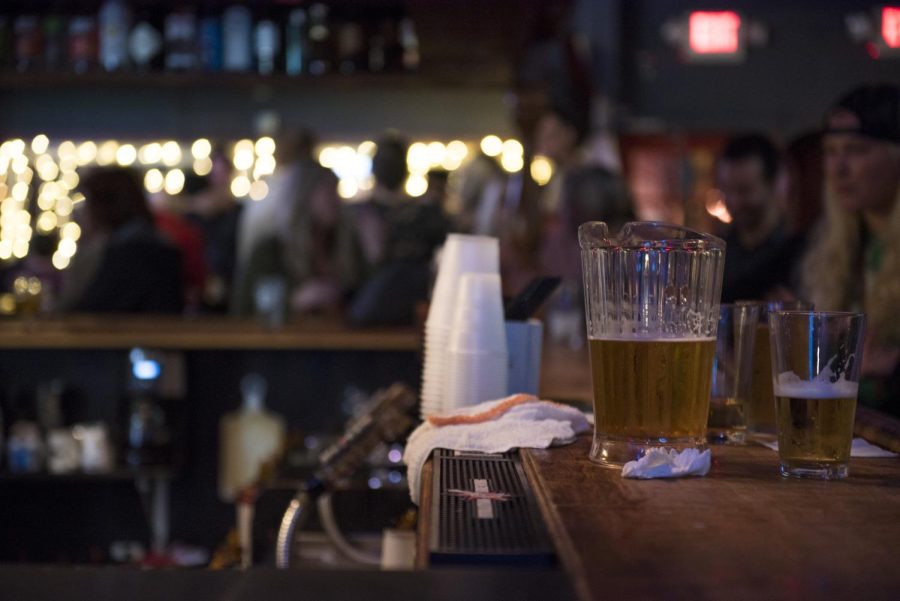Busted for booze: Reports of residence hall drinking decline
During Kent State’s 2016-17 academic school year, 131 documented drinking incidents occured on campus — 2 percent less than the 2015-2016 academic year. Out of those incidents, 740 total students were reported.
Despite the decrease in drinking cases, the university saw an increase specifically in the amount of parties in the residence halls. Brian Hellwig, the assistant director for Residential Communities, defines a party as consisting of three or more people.
“People were getting intoxicated to the point where they were harming themselves,” Hellwig said. “Seven or eight years ago, we implemented the policy where we could call the police for all known parties.”
Even though some halls allow alcohol, many don’t. Once someone is caught illegally drinking in a dorm room, the resident assistant has to decide whether to involve the Kent State University Police Department.
Hellwig said the police are called one-third of the time.
“Any time you call the police for alcohol parties and they cite someone, they’re going to be documented and automatically referred to student conduct,” Hellwig said. “When they’re cited by the police, they go through the student conduct process and also the court process.”
The student conduct process varies from person to person. Hellwig said the university usually gives the sanction to the courts, and if it’s a first offense, the offender goes through the diversion program.
The diversion program requires first-time drug or alcohol offenders to stay clean for six months, complete 20 hours of community service, pay a fine and go to an alcohol workshop. As long as the offender stays clean for six months with no violations, the offense can be voided from their record, Hellwig said.
“Alcohol is always an issue, but it’s not a huge concern,” Hellwig said. “When students meet with their hall director, they’re going to have a conversation about the impact their actions are having on the community and find ways to avoid that impact.”
The three busiest days of the week for alcohol-related incidents during 2016-17 were Saturday, with 66 incidents; Thursday, with 26 incidents; and Friday, with 21 incidents. Halloween fell on a Saturday last year, and 11 of the 66 incidents recorded on Saturdays occurred Halloween night.
“Over the past couple of years, especially around Halloween, it has been a lot tamer than in the years past, so we’re hoping to contribute that to just educating people,” said Tricia Knoles, the community resource officer of KSUPD.
Student conduct isn’t the only consequence facing college students when it comes to alcohol consumption.
Binge drinking is the most common alcohol use disorder (AUD) among ages 18-24, according to the Centers for Disease Control and Prevention (CDC). This is when someone drinks more than five alcoholic beverages in two hours and makes a person’s blood alcohol concentration (BAC) rise above 0.08, the legal limit. Symptoms include drinking more than intended on multiple days throughout the week or lacking the control to stop.
William Lechner, an assistant professor and expert in alcohol and nicotine addiction, said it’s easier for someone in the 18-24 range to have a diagnosis of AUD.
“A lot of students or (younger people who) tend to go out for drinks, end up drinking more than intended. … All you need is a few of those symptoms to have an AUD,” Lechner said.
Clinicians diagnose an individual for an AUD based on three levels: mild, moderate or severe alcoholism. Through a series of questions from the Diagnostic Statistical Manual — a guide listing every mental disorder’s description, symptoms and other criteria — the individual has to answer either yes or no.
Two to three symptoms need to be present for mild AUD, four to five symptoms for moderate AUD and six or more for severe.
One in four college students report poor academic performance from binge drinking, including missing classes and low scores on exams, according to the National Institute on Alcohol Abuse and Alcoholism (NIAAA).
In order to stop the progession of binge drinking and other issues, the most common sanction the university requires is alcohol eCHECKUP. It’s an online educational workshop that lasts about 30 minutes. It details the risks and behaviors associated with social alcoholic drinking.
“When (students) do get in trouble, we try to have an educational conversation with them,” Hellwig said. “It’s unrealistic to expect a student to never drink again, so when they do drink, we want to have that conversation to make sure that they’re making the right choices and keeping safe.”
Alex Cossin is a staff writer. Contact him at [email protected].
Miranda Kiner is a staff writer. Contact her at [email protected].
Lydia Taylor is the editor. Contact her at [email protected].
Crystal Smith contributed to this story.



